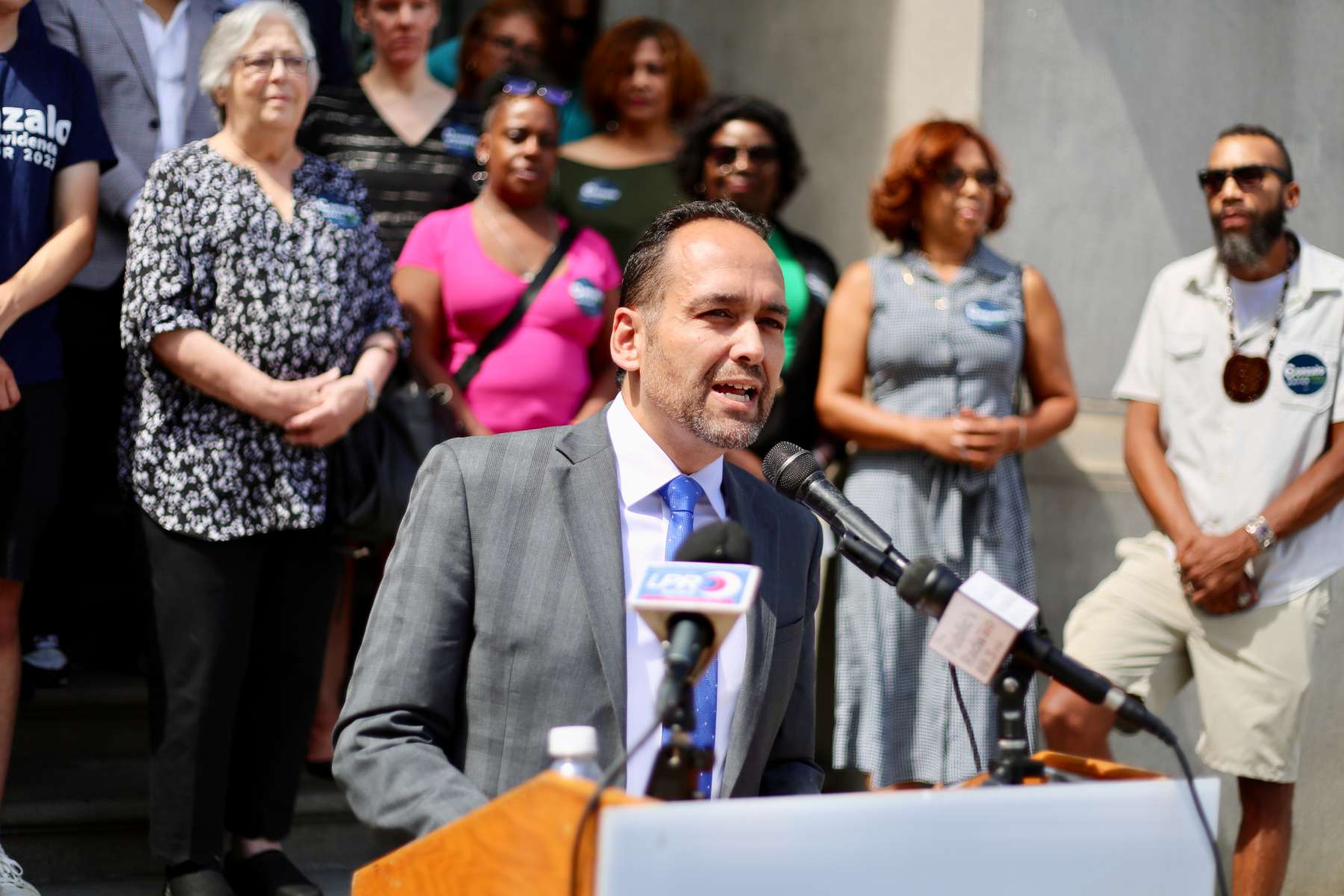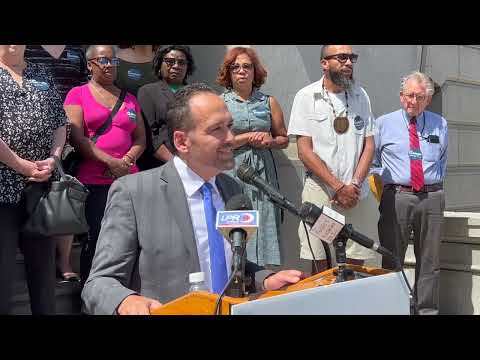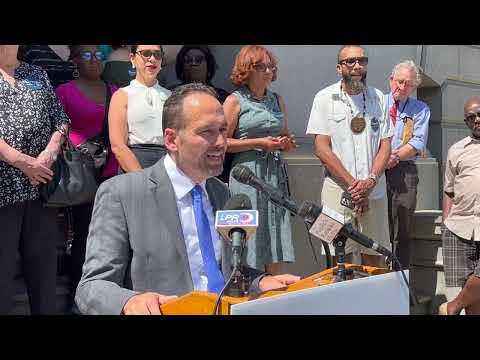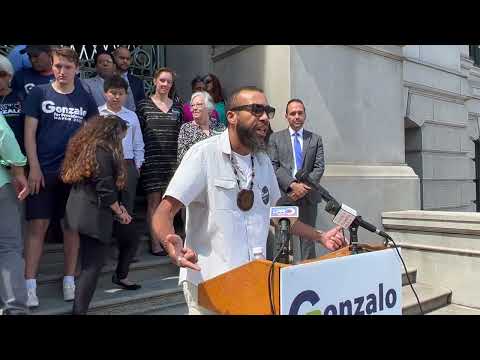Mayoral candidate Cuervo announces comprehensive economic vision for Providence
Cuervo’s economic platform contains many progressive economic development ideas, including centering Providence based businesses in city procurement and developing coops and other small businesses to cater to our anchor institutions such as the Universities and hospitals. The plan sets a high bar for the other candidates.
July 28, 2022, 12:38 pm
By Steve Ahlquist
Providence Mayoral candidate Gonzalo Cuervo, joined by supporters, stood on the steps of City Hall to announce his “comprehensive economic vision for Providence” on Wednesday. Cuervo, a former Rhode Island Deputy Secretary of State is running for Mayor of Providence against Brett Smiley, who worked as Chief of Staff for former Rhode Island Governor Gina Raimondo and Nirva LaFortune, a City Councilmember representing Providence’s Ward 3.
Cuervo’s economic platform contains many progressive economic development ideas, including centering Providence based businesses in city procurement and developing coops and other small businesses to cater to our anchor institutions such as the Universities and hospitals. The plan sets a high bar for the other candidates.
“Many of the challenges that Providence continues to face, including housing affordability, poor performing schools, and public safety, are underscored by a widening opportunity gap that impacts us all, regardless of zip code,” said Cuervo. “As Mayor, I will prioritize closing that gap and lifting thousands of families into the middle class through targeted strategies and investments in Providence’s greatest asset: its people.”
Cuervo laid out economic policy initiatives such as:
- Collaborate closely with the Governor and legislative leaders to align priorities around economic development opportunities in the capital city.
- Invest in emerging opportunities within the green and blue economies to activate the Port of Providence and create good jobs for Providence.
- Establish a community development financial institution (CDFI) in Providence to serve local businesses and make the city eligible to attract federal resources.
- Require equitable City contracting by expanding and codifying into law the procurement of goods and services from minority-owned, women-owned, and Providence-based businesses.
- Connect BIPOC business owners with capital, technical assistance, and professional support, while ensuring entrepreneurs have the resources they need to start new successful businesses.
- Negotiate with anchor institutions to increase their use of local vendors and suppliers, hire locally, and invest in affordable housing for their workforce.
- Transition away from Tax Stabilization Agreements as the City’s default economic development tool.
Neighborhood-based economic development strategies include:
- Decentralize the city’s Economic Development office by housing small business navigators in each neighborhood to meet and support entrepreneurs where they are, placing them with trusted community partners like community libraries to bring city government programs, third-party small business development resources, and expertise to their doorsteps. The navigators will provide easy access to coaching, connections, capital, and help navigating city permits to any potential or existing entrepreneur.
- Establish a network of experienced local accountants, attorneys, and technical support services providers to support small businesses in developing business plans, securing financing, and growing sustainably.
- Simplify the City’s business licensing structure to remove undue burdens on small businesses.
- Eliminate pervasive barriers for businesses, vendors, and developers (e.g. by shortening payment times).
- Develop or partner with existing resources to offer an Entrepreneurs Startup Boot Camp of online courses that provide information on the resources, funding, and technical assistance available in the city. These courses would provide a comprehensive checklist for business success.
- Expand support of key partners such as the RI Black Business Association and the RI Hispanic Chamber of Commerce.
- Create thousands of homeownership opportunities, increase housing stock, and incentivize development at every level and price point by leveraging all of the resources at the city’s disposal as well as state and federal resources.
- Regain local control of the Providence Public Schools and focus on long-term solutions centered around active engagement, teaching, and learning that prepare our children for success and entry into tomorrow’s Providence workforce.
Proposals to strengthen and leverage that sense of pride to generate economic activity include:
- Improve city services and operations using technology and public sector best practices and foster a culture of pride, buy-in, and community commitment among city employees.
- Support, elevate, and promote Providence’s rich and diverse cultural assets as a lever to generate economic activity and attract tourists to the city.
- Direct the City’s Economic Development Office and Department of Arts, Culture and Tourism to partner with stakeholders at every level in developing a comprehensive and diverse marketing strategy around Providence’s remarkable culinary, arts, and entertainment venues.
- Support downtown’s post-COVID transformation by activating public spaces through programming and infrastructure repairs, providing technical support and financial tools to local small businesses, and investing in the city’s tourism industry.
“None of this is simple. The idea that any of these problems can be solved with easy solutions or quick fixes is laughable. But that does not mean that change is not possible,” said Cuervo, wrapping up his speech before taking questions from the press. “By having a great plan, by choosing smart strategies, by attracting the best talent to implement those plans, and by sticking with them long enough to learn and adjust… we will succeed in making Providence a city where everyone has the opportunity to dream big, resiliently handle life’s challenges, and beam with pride.”
Progressive legislators including State Senators Tiara Mack and Samuel Bell have endorsed Cuervo, and reportedly there are more such endorsements to come.
Asked about a recent poll that placed him second in the race, Cuervo seemed nonplussed. “We’re running a very competitive race, we’re within the margin or error. We’re continuing to grow in parts of this city. We’re looking forward to winning this race.”
The poll results, from Boston Globe reporter Daniel McGowan, gave Smiley 31%, Cuervo 26%, and LaFortune 20%.
Some of the ideas in Cuervo’s economic plan were discussed with Uprise RI in an interview in September of last year. Here’s an excerpt:
UpriseRI: You spoke about building wealth, and I wasn’t going to talk about this, but there’s this interesting program out of Cleveland. What they’re doing is developing co-ops that are owned by people within Cleveland to take on city, hospital and university services – anchor and legacy institutions. The city helps to establish co-ops, co-owned by people within the city to provide these key services. instead of contracting with out-of-state or out-of-city vendors, the city, and the anchor institutions, contract with resident owned co-ops within the city. This keeps money circulating locally. It builds the tax base. it allows home ownership, better educational opportunities for youth. Good union co-op jobs with fair pay.
Cuervo: That’s a fascinating concept. There are a lot of services that are provided by city employees, union employees. And obviously, the city government has already privatized a lot of services that go to vendors and we can look at those services. And one of the ways that we’re going to grow our economy and raise our folks into the middle-class is by supporting the development of innovative small businesses. And I’ll tell you this – When I was at the Secretary of State’s office, I worked closely with Fuerza Laboral to pass legislation to expand the definition of co-ops because they wanted to establish a cleaning co-op, which they did. It was the first co-op that wasn’t an apartment complex in the state of Rhode Island. So I’m very familiar with co-ops.
The city spends more than a hundred million dollars a year purchasing goods and services, and we have no strategic approach to that other than to go to the “lowest bidder.” And even that process is sometimes questionable. Other cities have had unbelievable success in aksing, “How do we leverage our purchasing power?” We don’t have to spend one additional dollar to create economic opportunity in our cities. We pay vendors from Massachusetts and Connecticut and New York for what a small business or a co-op would provide here. It creates taxes here. And, and the money stays here.
UpriseRI: Because the ownership is here, right? Working people will be owners of the co-ops.
Cuervo: That’s how you build wealth in a community.
UpriseRI: They can buy a house. They’re paying more taxes. Then other businesses will come just to take care of our new rising co-op middle class.
Cuervo: Think about this. The City of Providence spends more than a hundred million dollars. And then you look at an organization like Brown University, which probably spends $40 or $50 million a year providing goods and services. And it’s like, “Why don’t you invest some of the money that you’re already spending in the local economy? It won’t cost you one additional penny, right?” It can help build our local economy in a way that’s sustainable and in a way that elevates more of our people into the middle-class. There’s too much of a wage and opportunity gap in our city and it only continues to grow. Outsiders fall in love with Providence and they move here and they squeeze out folks that don’t have economic mobility. Well, we want to give those folks economic mobility. We want to give them the ability to build wealth and by wealth, I mean home ownership wealth. I mean savings. We’re not talking about massive wealth. We’re talking about people earning living wages or running their own business and living with dignity with a good quality of life.
UpriseRI: Right. Not just the city, but all the legacy institutions in the city – the hospitals, the universities, certain corporations – all of them start pooling their money into local goods and services.
Cuervo: We can do that while recognizing that this doesn’t mean that we have to privatize more city services.
Here’s the question and answer session with the press:
“Gonzalo knows our communities,” said Providence Cultural Equity Initiative Founder and long-time community activist Raymond Two Hawks Watson, who introduced Cuervo at the event. “He has been living, working, listening, and leading in Providence for a long time, and he understands what people need.”









